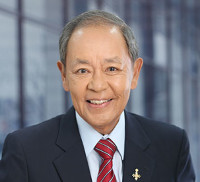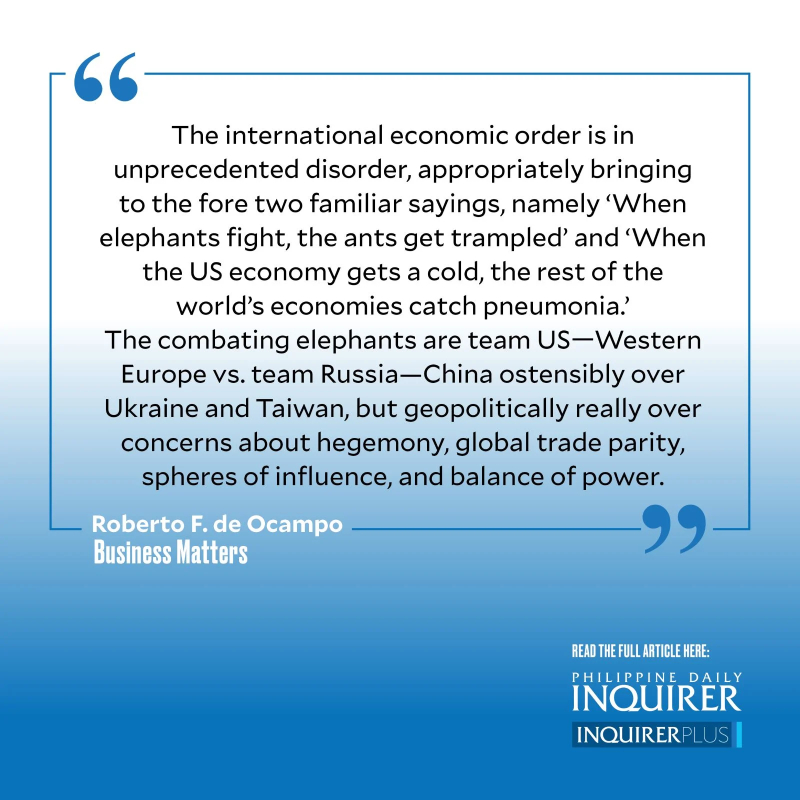- October 13, 2022
- Posted by: admin
- Category: Blogs

Ah yes, it’s time again for the contrived “first 100 days” assessment of a new administration. In a column I had written in 2010, I had stated: “I lean towards the view that excessive importance given to the first 100 days risks the maintenance of a short-term, quick-fix mentality that ultimately becomes self-deceiving. We have big problems to fix, institutions to build or rebuild, values to revisit and reinvigorate, an appropriate niche in the global economic landscape to establish. And we need to rid ourselves of a penchant for hoping for a political Messiah to solve all our woes.”
I continue to abide by that observation. However, we are indeed facing gargantuan challenges. Headline inflation in 2022 has climbed to 7 percent from 3 percent in the previous two years. The local prices of fish, sugar, and flour-based products have continued to rise. The exchange rate is approaching P60:$1 from about P52:$1, at the start of the Marcos Jr. administration. This combination of dire economic realities adds up to a progressively burdensome cost of living for the preponderant majority of Filipinos.

The good news for the administration is that the situation isn’t its fault. The international economic order is in unprecedented disorder, appropriately bringing to the fore two familiar sayings, namely “When elephants fight, the ants get trampled” and “When the US economy gets a cold, the rest of the world’s economies catch pneumonia.”
The combating elephants are team US—Western Europe vs. team Russia—China ostensibly over Ukraine and Taiwan, but geopolitically really over concerns about hegemony, global trade parity, spheres of influence, and balance of power. The economic weapons of war are sanctions and countersanctions, resulting in disruptions to the global financial system and supply chains for vital products, particularly oil and basic food stuff and agricultural inputs.
Furthermore, the US not only caught just a cold but pneumonia, with unsynchronized fiscal and monetary policies, highlighted by excessive printing of currency, resulting in a record inflation rate of 8 percent. In response, the US Federal Reserve has been applying draconian interest rate escalation measures to absorb dollar liquidity worldwide, thus decreasing its supply, increasing dollar value, and lowering the comparative value of just about all other currencies. And the Fed isn’t quite done yet!
That could mean further depreciation of our peso—a truly challenging prospect for our economic managers. If it’s any comfort, many other countries are doing worse than us. The US inflation rate is worse; the depreciation of the British pound, Japanese yen, and Korean won has been greater; and the growth rate of the European Union is expected to plunge by half from about 2.6 percent to 1.3 percent, as most of Western Europe faces certain recession. Meanwhile, international observers (including the World Bank and Asian Development Bank) continue to be relatively sanguine about our prospects going forward.
Nevertheless, it’s not the time to relax. The first 100 days could help set the tone toward keeping our economy afloat in the midst of a perfect global economic storm. To his credit, the President appointed a top-notch economic team. The Bangko Sentral ng Pilipinas, in particular, while having no choice but to raise interest rates in the face of the US Fed’s actions, has proceeded prudently to dampen inflation and price hike pressures, while the Department of Finance has wisely resisted various populist appeals that would actually worsen the fiscal situation and aggravate inflation.
The first 100 days also saw critical amendments to the implementing rules and regulations of public-private partnerships that provide substance to the President’s announced desire for more private sector participation in the face of a tightening budgetary situation. Despite the sugar importation brouhaha, there seems to be growing appreciation toward extending the easing of quantitative restrictions, promulgated by the Duterte administration, on vital food imports beyond its present December expiration.
Still, President Marcos Jr. must be unrelenting in signaling that, under the present global circumstances, the ship of state must sail coordinated and united with all hands on deck, and with him as captain clearly leading the way while leaning toward a more hands-on, rather than detached, management tone.
